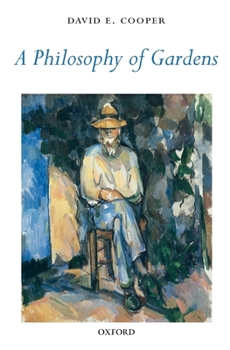A Philosophy of Gardens
Select Format
Select Condition 
Book Overview
Why do gardens matter so much and mean so much to people? That is the intriguing question to which David Cooper seeks an answer in this book. Given the enthusiasm for gardens in human civilization ancient and modern, Eastern and Western, it is surprising that the question has been so long neglected by modern philosophy. Now at last there is a philosophy of gardens. Not only is this a fascinating subject in its own right, it also provides a reminder that the subject-matter of aesthetics is broader than the fine arts; that ethics is not just about moral issues but about 'the good life'; and that environmental philosophy should not focus only on 'wilderness' to the exclusion of the humanly shaped environment. David Cooper identifies garden appreciation as a special human phenomenon distinct from both from the appreciation of art and the appreciation of nature. He explores the importance of various 'garden-practices' and shows how not only gardening itself, but activities to which the garden especially lends itself, including social and meditative activities, contribute to the good life. And he distinguishes the many kinds of meanings that gardens may have, from representation of nature to emotional expression, from historical significance to symbolization of a spiritual relationship to the world. Building on the familiar observation that, among human beings' creations, the garden is peculiarly dependent on the co-operation of nature, Cooper argues that the garden matters as an epiphany of an intimate co-dependence between human creative activity in the world and the 'mystery' that allows there to be a world for them at all. A Philosophy of Gardens will open up this subject to students and scholars of aesthetics, ethics, and cultural and environmental studies, and to anyone with a reflective interest in things horticultural.
Format:Paperback
Language:English
ISBN:019923888X
ISBN13:9780199238880
Release Date:April 2008
Publisher:OUP Oxford
Length:184 Pages
Weight:0.52 lbs.
Dimensions:0.4" x 5.4" x 8.0"
Customer Reviews
1 rating
Not for the casual gardener.
Published by Thriftbooks.com User , 16 years ago
This is a work of philosophy with abundant references to Kant and other philosophers. So the casual reader of garden books should be forwarded! Professor Cooper's approach is interesting and welcome to the relatively small number of rigorously philosophical treatments of gardens. I would like to say that Cooper is a philosopher in the Anglo-Analytic tradition, especially for his fine attention to language; some readers may be put off by his near obsession with precision of language. However, I was pleased to find numerous references to some of the analyses of gardens coming from literature, even quotations from Rumi and Japanese Zen. Overall, a rigorously philosophical approach to the place of gardens in human life. Worth reading IF you have a strong background (I'd say nothing less than a BA) in Western philosophy.






